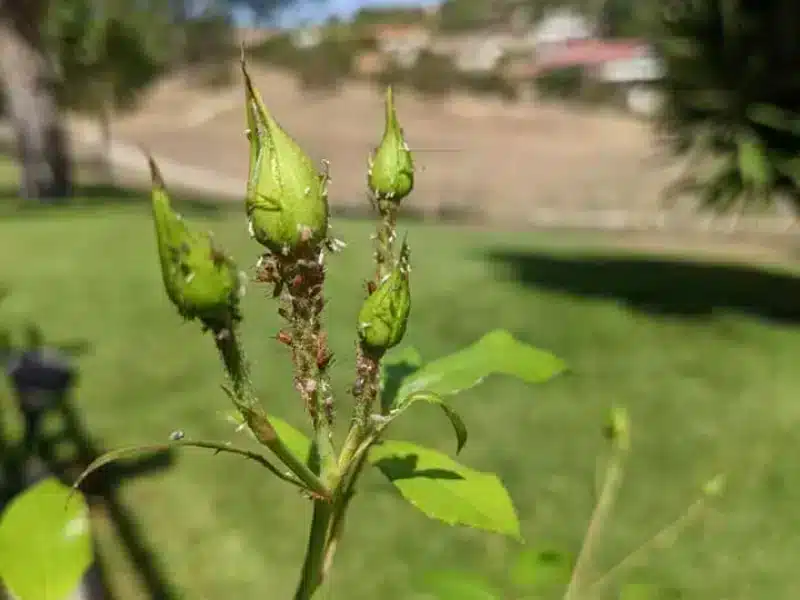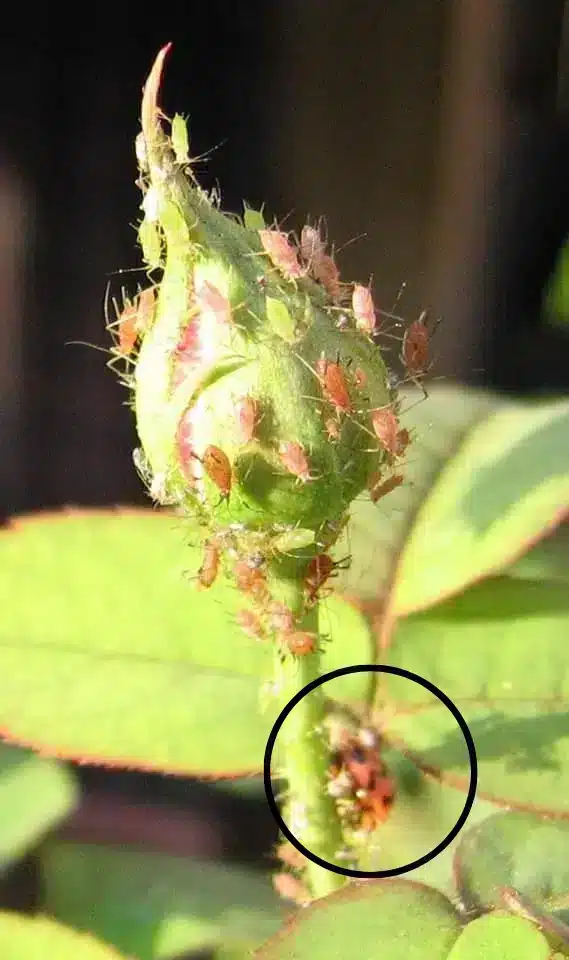8 Proven Ways to Get Rid of Aphids on Roses
Rose aphids (Macrosiphum rosae) are small, sap-sucking insects that can quickly multiply and cause damage to roses. Aphid-infested roses often have curled leaves, yellowing foliage, and stunted growth. Aphids can weaken the entire plant and even spread diseases if left unchecked.
To get rid of aphids on roses, wash them off the plant with a strong spray of water, use insecticidal soaps or neem oil to kill them, or introduce natural aphid predators like ladybugs or lacewings. Also, companion plants like garlic or chives deter aphids and protect your roses.

There is a variety of aphid species that attacks roses. They include the rose aphid (Macrosiphum rosae), the potato aphid (Macrosiphum euphorbiae), the cotton aphid (Aphis gossypii), and the melon aphids (Aphis gossypii), among others.
Roses (Rosa spp.) are commonly attacked by rose aphids. Rose aphids are small (about ⅛ inch long), soft-bodied, pear-shaped insects that come in pink or green.
Signs of aphids on rose bushes
Here are the signs to watch out for if your roses are infested with aphids:
- Curling leaves: One of the most noticeable signs of aphids on roses is the curling of the leaves on the rose. This is caused by the aphids feeding on the lower parts of the rose leaves.
- Sticky droplets, also known as honeydew, stick on the leaves or the ground beneath the rose. The honeydew is a byproduct of the aphids’ feeding on the rose plant.
- Presence of aphids: If you examine the plant closely, you may be able to spot the aphids themselves.
- Black sooty mold on the leaves, stems, and buds results from the honeydew secreted by the aphids as they feed on the roses.
How to Get Rid of Aphids on Roses
If you see any of these signs, it’s important to take action to address the aphid infestation. The aphids can cause serious damage to your rose plants, leading to stunted growth, wilted leaves, and even the death of the plant if left untreated.
Here are the different ways to get rid of aphids on your roses:
1. Ginger and garlic treatment
I’ve found bitter solutions to work so well on rose bushes infested with aphids. Here’s how I use the ginger + garlic remedy to get rid of aphids on roses:
Grind ginger and garlic, then add one tablespoon of each in a bottle. Add 1/2 liter of water and let it sit for 30-60 minutes. Sieve the solution into a spray bottle and spray it on the aphids.
Repeat the treatment up to four times until all the aphids are eliminated.
2. Garlic + chilli + onion + ginger
Another potent homemade aphid killer that works for me on my indoor plants is a solution made from garlic, green chilies, onion, and ginger. Here’s how to make it:
- Crush 4 cloves of garlic, 3 chilies, half an onion, and two pieces of ginger.
- Boil the crushed vegetables in 2 glasses of water for 10 minutes.
- Allow the solution to cool.
- Strain the mixture into a jug.
- Add a few drops of liquid dish soap and stir to mix well.
- Pour the mixture into a spray bottle and spray the infested roses to kill the aphids.
In my experience, this solution kills aphids, spider mites, thrips, and many other pests on roses and almost all indoor plants.
Repeat the treatment on alternate days for about 7 days to kill aphids to the last one.
Here are process images:
3. Remove aphids manually
There are various methods to use to control aphids on your roses mechanically if the infestation is not very extensive:
- Physically dislodging them: You can manually brush them off the stems and leaves using your fingers or a wet cloth. This method is effective for a small aphid infestation.
- Flush them off with a jet of water from the foliage: Spray them with water from a nozzle at a high pressure washing them off the plant to the ground. They won’t be able to climb up since they are slow movers and flightless. This method is effective for a large infestation.
- Prune the affected leaves: Use sterilized shears to cut off the infested foliage. Pruning will help prevent the infestation from spreading to the rest of the roses’ foliage.
4. Biological control

Biological control is an effective and environmentally-friendly method of controlling aphids on roses. This approach involves introducing natural predators or parasites that feed on aphids and keep their populations in check.
Examples of natural aphid-eating insects include lacewings, ladybeetles, hoverflies, and parasitic wasps. Parasitic wasps lay their eggs inside the aphids, then develop into larvae that feed on the aphid. These parasitized aphids (mummies) look swollen and brown to gray.
Companion planting is another biological way to eliminate aphids on your roses. Plants like garlic, chives, and marigolds produce natural compounds that repel aphids.
By planting these companion plants near your roses, you can help keep aphids away and reduce the risk of an infestation.
5. Apply pesticides
This is the best method to use if you have a large-scale infestation of aphids on your roses.
However, there are two major downsides to using chemical insecticides to get rid of aphids in your rose garden. First, pesticides kill off beneficial insects like wasps and ladybugs. Second, chemical insecticides are toxic and may harm your roses’ leaves if not diluted to the proper concentrations.
To properly get rid of aphids on roses by spraying with a chemical insecticide, follow the procedure below:
- Wear a pair of gardening gloves, and a surgical face mask, especially if you’re allergic to the smell of chemical fumes.
- Dilute the insecticide as per the manufacturer’s instructions, and transfer the solution into a gardening spray can.
- Spray your rose bushes to target the underside of the leaves where aphids tend to hide. If possible, use a fine-jet nozzle to release fine streams directly onto the rose leaves you’re targeting.
- Respray for maximum efficiency to ensure all aphids are eliminated.
Imidacloprid is one of the best pesticides against aphids.
6. Apply a vinegar spray
Vinegar contains acetic acid that can kill aphids by damaging their outer layer and causing them to dry out. It disrupts the aphid’s cell membranes and other functions. However, vinegar should be used cautiously as it may harm the leaves of your roses.
To effectively use vinegar spray for aphids, follow the procedure elaborated below:
- Fill a spray bottle with white vinegar and distilled water in a ratio of 1:2.
- Spray the vinegar solution directly onto the rose bushes.
Vinegar solution is one of the most effective natural aphid remedies, as it kills aphids and their larvae as soon as they come into contact with them.
7. Apply dish soap solution
Dish soap solution kills aphids by breaking down their outer coating and causing them to dehydrate. It also helps to suffocate the aphids and prevent them from breathing.
To effectively destroy aphids on your rose bushes using a dish soap solution, follow the procedure detailed below:
- Pour a liter of water into a bucket, then add two drops of Organic dish soap. Note that the number of drops may be more or fewer depending on how concentrated you need the solution.
- Next, stir the mixture and transfer the solution into a garden spray can.
- Now, spray the solution all over your rose bushes to eliminate the aphid colony.
Pro tip: Spray dish soap solutions on your roses early in the day when the weather is still cool, as the combination of hot weather and the solution can trigger leaf scorching. Also, rinse the rose plant thoroughly with water after treatment to avoid damaging the plant.
8. Neem Oil
Neem oil is another effective, natural aphid killer when applied repeatedly. It is effective on white aphids. The oil disrupts aphids’ hormonal balance, feeding behavior, and reproduction cycle. It also coats the aphids’ bodies and suffocates them.
The main advantage of using a natural pesticide like neem oil to destroy aphids is that it won’t harm beneficial insects, compared to chemical-based insecticides. It’s also non-toxic to pets and humans.
To effectively use neem oil to get rid of aphids on your rose bushes, follow the procedure outlined below:
- Mix neem oil with water in a bucket. Ensure you follow the instructions on the bottle.
- Then spray the mixture on your rose garden leaves, stems, and blossoms to eliminate all aphids. Target the nozzle at the leaf undersides, as this is where aphids love to take cover.
- Repeat the process if the first attempt didn’t work effectively.
Pro tip: Lay off direct irrigation of your rose foliage after applying neem oil to avoid washing off the pesticide solution.
Conclusion
Regularly monitoring your roses for aphid infestations and taking immediate action is key to keeping your roses healthy and beautiful. Use effective aphid control methods such as natural predators, insecticidal soaps and oils, or companion plants to help control aphids and keep your roses aphid free.
References
- Agriculture and Natural Resources, University of California: https://ipm.ucanr.edu/PMG/PESTNOTES/pn7466.html
- Clemson Cooperative Extension Home & Garden Information Center: https://hgic.clemson.edu/factsheet/rose-insects-related-pests/


